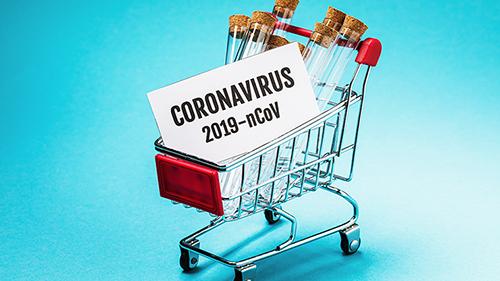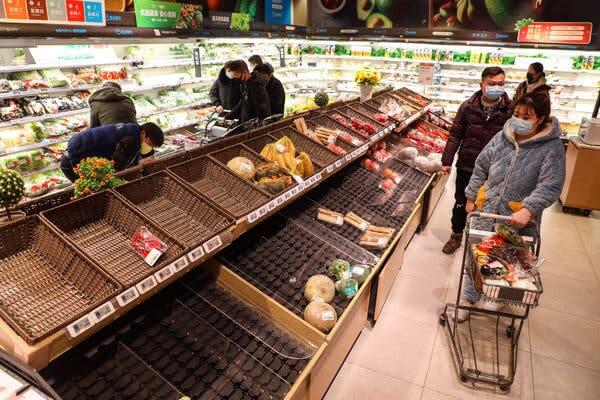Coronavirus Panic Buying - What Does Psychology Say about It?


Written and verified by the psychologist Valeria Sabater
Empty shelves. Long lines with full carts. Nervousness, haste, sharing anxious glances with those around you, and the fear of running out of supplies, food, and toilet paper. Coronavirus panic buying is an increasingly frequent phenomenon that surprises us, and, at the same time intensifies the feeling of panic.
But does it make any sense to go en masse to the supermarket and buy massive amounts of food to store at home? Or are we perhaps witnessing some clearly irrational behavior? Firstly, there’s one obvious fact. The advance of the COVID-19 outbreak is forcing us to take extraordinary measures, and one of them is quarantine.
Also, some people are being forced to stay in their homes for 15 days or more. Something like this obviously requires sufficient resources to be available during this time of confinement. However, the supermarket chains are telling us that there aren’t any supply problems; the products are replenished normally and there’s no sign that this is going to change.
However, despite this, the fear is obvious. Panic buying is everywhere: whether you live in the United States, New Zealand, Spain, France, or Malaysia. However, this behavior isn’t new and there are a number of very specific reasons for it. We’re going to analyze them now.

Coronavirus panic buying: what’s it all about?
Abraham Maslow told us in his famous pyramid of basic needs that the foundation of our well-being – on the first step – is the need to have food for our survival. In the midst of a context of uncertainty and fear, having basic resources at home generates calm in our brain. This is understandable.
However, a fact that we’ve been able to verify is that it takes very little for us to suddenly react to something with panic. It’s clear that we must be proactive.
However, the same reaction en masse causes situations that we all want to avoid: the shortage of certain products, long lines, and even situations of stress and confrontation between people. Because of this, we need to take some aspects of the coronavirus panic buying into account.
Being proactive, yes; panic buying, no
David Savage is a Professor of Behavioral Science and Microeconomics at Newcastle University in Australia. One thing he says is that we should be far-sighted. The possibility of having to follow a 15-day quarantine is real, and, as such, we have to be prepared. However, we must do it in a rational and balanced way.
What do we mean by “rational and balanced”? It means not buying 15 packs of toilet paper. It means not putting 20 bottles of hydroalcoholic gel in your cart. This is exactly what’s happening in many cities and countries, shaping irrational storage behavior that will have two main negative consequences. The first is that these products will run out. The second is that they’ll increase in price.

Panic buying generates more panic: the vicious cycle of fear
The media are also, in a way, to blame for this panic. Coronavirus panic buying isn’t just an instinctive reaction of people to a situation of fear and uncertainty.
Seeing images of people panic buying on TV or in the videos you share through social networks has a contagious effect.
Let’s remember that beyond the COVID-19 virus, there’s nothing as contagious as the distress of feeling that you’ll run out of supplies if you don’t act quickly.
The suspicious mind and the desire to be in control
Steven Taylor is a clinical psychologist and professor at the University of British Columbia. One of his most relevant works is The Psychology of Pandemics. In this book, he explains an interesting aspect that we should all take into account.
The human mind often distrusts the information it receives. There’s always the feeling that “we’re not being told everything”. Sometimes, we believe the fake news we read and, other times, we get contradictory information. These situations only feed your fear and you feel the need to be in control.
One way to achieve this is through shopping. You know that washing your hands and maintaining adequate protection and hygiene measures certainly help. However, coming home and having cupboards full of food and basic necessities relieves and comforts you and gives you that much-needed feeling that you’re in control.
The alternative: rational purchasing in a crisis context
Coronavirus panic buying fuels panic, and you must avoid falling into this trap. Nevertheless, it’s evident that we’re experiencing an extraordinary situation with COVID-19.
This context obviously forces you to adapt to the situation. However, the key to successfully facing this reality is, first of all, to act with calm, balance, and intelligence. This is how you’ll bring out the best in yourself.
Therefore, the answer to whether we should be proactive is yes, but in a rational way.
Is it advisable to increase our volume of purchases from one day to the next? Well, everything will depend on the instructions we’ve received from the experts.
Quarantine or school closure
If you’re going to be at home for an extended period of time due to quarantine or if the schools are closed and your children are going to be at home during the day, then you’ll obviously need to prepare for this.
- You must avoid panic buying. Behavior driven by anxiety and fear makes the situation worse: prices start rising and products become scarce.
- You should buy what you need on a daily basis – no more, and no less.
- If the health institutions recommend any specific measures, then you can act accordingly.
- You mustn’t think irrationally about the future – stores won’t run out of supplies. You’ll be able to shop normally whenever you need to.
To conclude, if you feel that this situation is becoming too overwhelming for you at any time, then don’t hesitate to contact specialized professionals.
Crises are faced with calm, consensus, and civic behavior, where people come together to motivate and encourage each other. As of today, we can see some good news. China is winning the battle and there are up to eight vaccine projects currently in progress.
Empty shelves. Long lines with full carts. Nervousness, haste, sharing anxious glances with those around you, and the fear of running out of supplies, food, and toilet paper. Coronavirus panic buying is an increasingly frequent phenomenon that surprises us, and, at the same time intensifies the feeling of panic.
But does it make any sense to go en masse to the supermarket and buy massive amounts of food to store at home? Or are we perhaps witnessing some clearly irrational behavior? Firstly, there’s one obvious fact. The advance of the COVID-19 outbreak is forcing us to take extraordinary measures, and one of them is quarantine.
Also, some people are being forced to stay in their homes for 15 days or more. Something like this obviously requires sufficient resources to be available during this time of confinement. However, the supermarket chains are telling us that there aren’t any supply problems; the products are replenished normally and there’s no sign that this is going to change.
However, despite this, the fear is obvious. Panic buying is everywhere: whether you live in the United States, New Zealand, Spain, France, or Malaysia. However, this behavior isn’t new and there are a number of very specific reasons for it. We’re going to analyze them now.

Coronavirus panic buying: what’s it all about?
Abraham Maslow told us in his famous pyramid of basic needs that the foundation of our well-being – on the first step – is the need to have food for our survival. In the midst of a context of uncertainty and fear, having basic resources at home generates calm in our brain. This is understandable.
However, a fact that we’ve been able to verify is that it takes very little for us to suddenly react to something with panic. It’s clear that we must be proactive.
However, the same reaction en masse causes situations that we all want to avoid: the shortage of certain products, long lines, and even situations of stress and confrontation between people. Because of this, we need to take some aspects of the coronavirus panic buying into account.
Being proactive, yes; panic buying, no
David Savage is a Professor of Behavioral Science and Microeconomics at Newcastle University in Australia. One thing he says is that we should be far-sighted. The possibility of having to follow a 15-day quarantine is real, and, as such, we have to be prepared. However, we must do it in a rational and balanced way.
What do we mean by “rational and balanced”? It means not buying 15 packs of toilet paper. It means not putting 20 bottles of hydroalcoholic gel in your cart. This is exactly what’s happening in many cities and countries, shaping irrational storage behavior that will have two main negative consequences. The first is that these products will run out. The second is that they’ll increase in price.

Panic buying generates more panic: the vicious cycle of fear
The media are also, in a way, to blame for this panic. Coronavirus panic buying isn’t just an instinctive reaction of people to a situation of fear and uncertainty.
Seeing images of people panic buying on TV or in the videos you share through social networks has a contagious effect.
Let’s remember that beyond the COVID-19 virus, there’s nothing as contagious as the distress of feeling that you’ll run out of supplies if you don’t act quickly.
The suspicious mind and the desire to be in control
Steven Taylor is a clinical psychologist and professor at the University of British Columbia. One of his most relevant works is The Psychology of Pandemics. In this book, he explains an interesting aspect that we should all take into account.
The human mind often distrusts the information it receives. There’s always the feeling that “we’re not being told everything”. Sometimes, we believe the fake news we read and, other times, we get contradictory information. These situations only feed your fear and you feel the need to be in control.
One way to achieve this is through shopping. You know that washing your hands and maintaining adequate protection and hygiene measures certainly help. However, coming home and having cupboards full of food and basic necessities relieves and comforts you and gives you that much-needed feeling that you’re in control.
The alternative: rational purchasing in a crisis context
Coronavirus panic buying fuels panic, and you must avoid falling into this trap. Nevertheless, it’s evident that we’re experiencing an extraordinary situation with COVID-19.
This context obviously forces you to adapt to the situation. However, the key to successfully facing this reality is, first of all, to act with calm, balance, and intelligence. This is how you’ll bring out the best in yourself.
Therefore, the answer to whether we should be proactive is yes, but in a rational way.
Is it advisable to increase our volume of purchases from one day to the next? Well, everything will depend on the instructions we’ve received from the experts.
Quarantine or school closure
If you’re going to be at home for an extended period of time due to quarantine or if the schools are closed and your children are going to be at home during the day, then you’ll obviously need to prepare for this.
- You must avoid panic buying. Behavior driven by anxiety and fear makes the situation worse: prices start rising and products become scarce.
- You should buy what you need on a daily basis – no more, and no less.
- If the health institutions recommend any specific measures, then you can act accordingly.
- You mustn’t think irrationally about the future – stores won’t run out of supplies. You’ll be able to shop normally whenever you need to.
To conclude, if you feel that this situation is becoming too overwhelming for you at any time, then don’t hesitate to contact specialized professionals.
Crises are faced with calm, consensus, and civic behavior, where people come together to motivate and encourage each other. As of today, we can see some good news. China is winning the battle and there are up to eight vaccine projects currently in progress.
All cited sources were thoroughly reviewed by our team to ensure their quality, reliability, currency, and validity. The bibliography of this article was considered reliable and of academic or scientific accuracy.
- Taylor, Steven (2019) The Psychology of Pandemics. Cambridge Scholars
This text is provided for informational purposes only and does not replace consultation with a professional. If in doubt, consult your specialist.







